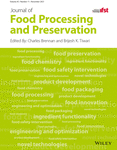In vitro antimicrobial, antiradical, anticancer evaluation, and phytochemical contents of endemic Scorzonera semicana DC
Abstract
In the present study, antimicrobial, antiradical, and anticancer properties with phytochemical compounds of endemic Scorzonera semicana DC., which grown in Elazig (from Turkey) around and consumed as a vegetable, were investigated. The antiradical properties of extracts were determined via DPPH, ABTS, OH radical scavenging activities, and their antimicrobial properties were determined against several microorganisms. Anticancer properties of this plant were determined by MTT assay on the HCT-116, LNCaP, and MCF-7 under in vitro conditions. It was determined that S. semicana water (94.81%) and methanol (98.87%) extracts for scavenging of ABTS (BHT, 93.24%); water, ethanol, and methanol extracts (84.97%, 84.29%, and 84.62%, respectively) for scavenging of OH radicals showed higher activity than BHT (75.77%). It was observed that flavonoid (5,555.34 µg CE/g), proanthocyanidin (1,860.78 µg CE/g), and phenolic (134.89 mg GAE/g) contents were found to be highest in S. semicana methanol extract. All extracts had higher antimicrobial activity than standard antibiotics against Listeria monocytogenes. This plant showed very effective anticancer activity increasing dose-dependently on LNCaP, MCF-7, and HCT-116 cancer cell lines.
Practical applications
In Turkey, Scorzonera semicana DC. is cultivated and consumed as vegetables, and the roots, fresh shoots of this species are consumed by the name of “yemlik” as feed or fresh in Anatolia. This study investigated its antiradical, antimicrobial, anticancer, phytochemical properties and is first report about in vitro biological properties of S. semicana. According to our results, S. semicana most effective for ABTS and OH radical scavenging activity and show very effective anticancer activity on LNCaP, MCF-7, HCT-116 cells.
CONFLICTS OF INTEREST
The author declares that there is no conflict of interest that could be perceived as prejudicing the impartiality of the research reported.
Open Research
DATA AVAILABILITY STATEMENT
The data that support the findings of this study are available from the corresponding author upon reasonable request.




